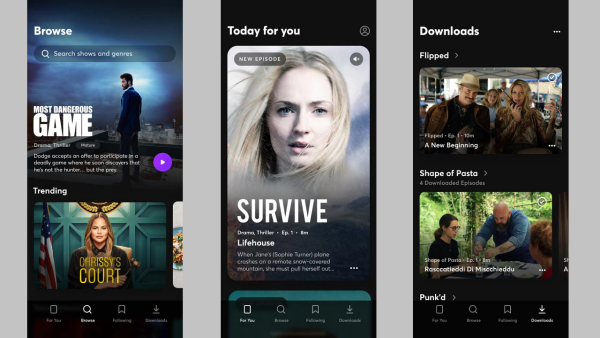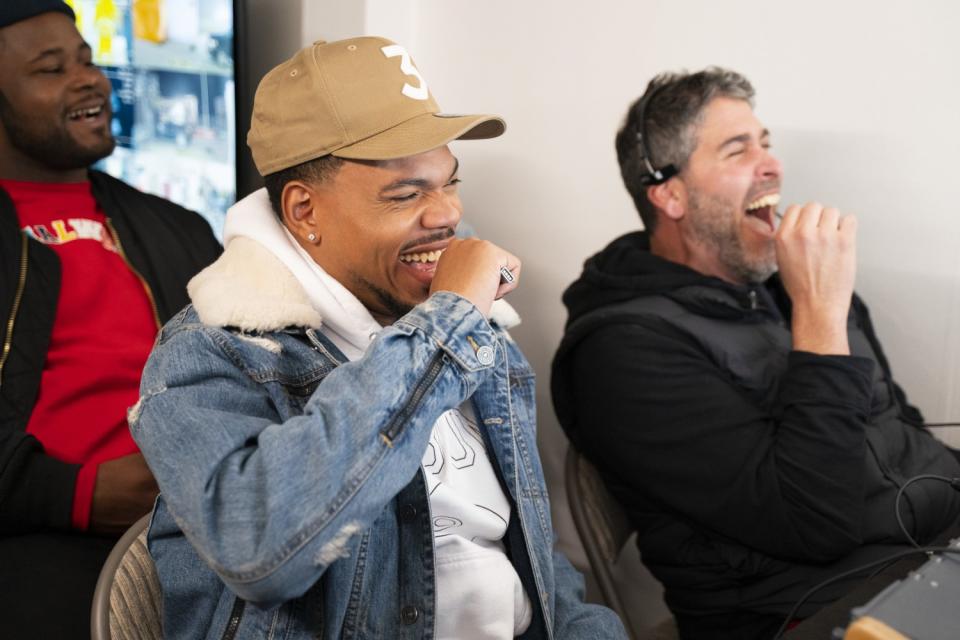Quibi is YouTube for people who hate YouTube. Let us explain

Quibi, the latest entrant in the streaming wars, debuted Monday to some fanfare — and, according to app analytics firm Annie, more than 300,000 downloads in the U.S. and Canada.
The short-form service, designed for viewers on the go, arrives at a moment in which many are staying at home to limit the spread of the coronavirus. (In early March, Quibi, which costs $4.99 per month with ads and $7.99 per month without, extended its free trial period to 90 days.) But its long-term success will depend on whether it offers viewers content worth their time and money. Times television critics Robert Lloyd and Lorraine Ali debated the merits (and demerits) of Quibi to help you decide.

Robert Lloyd: And here comes Quibi, the phone- and tablet-only streaming platform overlorded by Jeffrey Katzenberg and Meg Whitman, with its snack-sized content available in flavors familiar to anyone who has watched television or YouTube before: drama, comedy, reality, prank shows, retooled MTV game shows, dance-offs. With some $1.75 billion in pocket, honey to draw the big Hollywood bears, the money is definitely on the tiny little screen — though production values can only get you so far.
Super-respectable names like Spielberg, Soderbergh, Del Toro and Raimi reportedly are on deck to bring their magic to this enterprise — it’s a Netflix move, throwing money at Hollywood. But what’s available now is, to my eye, largely a mix of meh to hmmm to, less often, Well I Quite Like That. I like the documentaries most of all, Chrissy Teigen as a Judge Judy with her mother as the bailiff, and “Flipped,” a well-written serial comedy with Will Forte and Kaitlin Olson as a talentless couple aspiring to house-renovation reality show fame, produced by Will Ferrell and Adam McKay’s Funny or Die, which has long practical experience in short- and long-form humor. (To be fair, "meh to hmmm to Well I Quite Like That" also describes the range of "actual" television.)
Lorraine Ali: Brace yourself, Robert — and maybe your phone on a desktop mount for optimal Quibi viewing. I surprisingly like the platform’s truncated, tiny-screen reframing of big TV. Its curated collection of original shows is a welcome alternative to the short-form viewing experience I’ve grown accustomed to bemoaning. YouTube is like rummaging through the final sale bin of a deep discount store. There’s a lot of clutter, it’s a lot of work, and there are not enough redeeming finds among all the amateur skit comedy my teenager hate-watches to justify the time spent. Quibi’s a better option for impatient viewers like myself, who want to avoid endless wormholes but value series TV that clocks in under 10 minutes per episode.
Lloyd: Having sampled the entirety of the app’s non-newsy content — about half of the 50-some series available at launch, plus a few things coming soon — and some of the news channels, and one where a woman speaks softly to you while images of Malibu lap softly at your eyes, this thing has not been made with me in mind. (Yes, I admit it, I am demographically irrelevant.) And second, the vertical format — the way you hold your phone usually — is terrible for storytelling. It makes the central image bigger but omits context and detail. I will stop short of making that a generational metaphor. (You can also choose a horizontal format, happily.)

Ali: The vertical storytelling doesn’t bother me, which is odd because everything else on my phone does. The production values of most Quibi shows are relatively high, and though I didn’t think that would matter much for small viewing, it made a big difference. LeBron James’ docuseries “I Promise,” which chronicles the first year of an experimental public school he founded for at-risk youth, feels up close and personal; it connects with the intimacy of a self-made iPhone video but looks like a well-made documentary film. Same goes for “Run This City,” a series that follows Jasiel Correia II in his role as the youngest-ever mayor of Fall River, Mass. Both are compact and powerful, even while catering to limited attention spans like mine.
Lloyd: Yes, "I Promise" and "Run This City" are as good as you say, especially once the latter gets into the darker side of Correia's tenure; but both are essentially long-form documentaries chopped into episodic bits, and given the whole run of either I would watch them straight through. By contrast, "Shape of Pasta," in which L.A. chef Evan Funke travels to remote Italian towns to learn to make rare and endangered pasta shapes from women — older women, in the episodes I've seen — expert in their creation, does use the short form well; each episode is a self-contained encounter that packs in a lot of information, a cooking demonstration and a moving human encounter in about the time it takes pasta to cook. I found it moving and addictive.
Ali: Al dente TV! Quibi’s ode to noodles is an example of what works best on the platform, which is quirky, unscripted fare. “Memory Hole" boldly revisits the most embarrassing moments in pop culture (example: the L.A. Rams' rap video “Ram It”) with guest stars like Jason Bateman and Patton Oswalt, while “Murder House Flip" combines genres when home renovation experts attempt to flip homes where infamous murders took place. Ridiculous and macabre, so of course I love it.
Lloyd: On the other hand, for all their polish and edginess, the dramas — including some upcoming series we are embargoed from mentioning — felt like routine genre exercises to me, like expertly executed, impressively acted student films. And in spite of the nominal formal novelty of the service — which, after all, is not that novel, as the web has been producing eight- to 10-minute serial and episodic comedies, dramas, documentaries and news shows for ages — nothing seems that formally challenging. (Of course, those earlier shows lacked a dedicated app. Perhaps it's the app that will make the difference here.) What I like about YouTube, and other web-based platforms, with their open doors and low bars (you do not need to take a meeting with Jeffrey Katzenberg, or anybody, to get your show onto YouTube), is that what it has to offer is unpredictable, personal, oddly shaped. (And I don't have a hate-watching teenager's skit shows to navigate.)
Ali: I agree that the democratic nature of YouTube and the like is a good thing. But it’s overwhelming and I’ve found in the current political climate of misinformation and polarizing rants, I need corporate alternatives to the corporate alternative. I’m sure that will change when the pendulum swings back toward total studio control, and Quibi has devoured us all.

